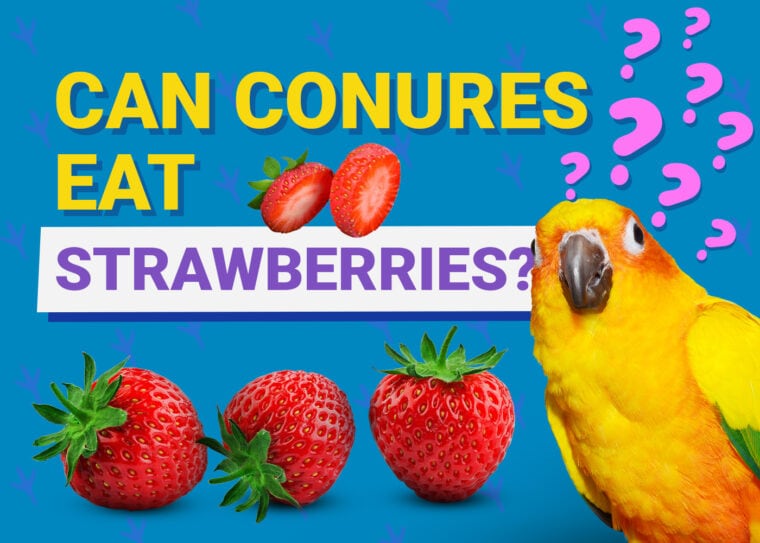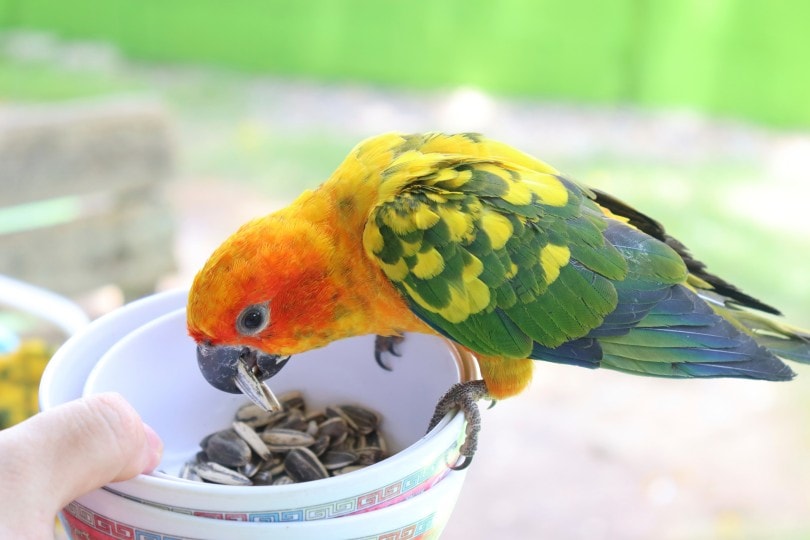
With over 100 species of parrots included, conures are a varied group of energetic birds that make excellent pets for any family. Conures consume a balanced diet of seeds, pellets, fruits, and vegetables, but can they eat strawberries? Yes, conures can eat strawberries, and when fed in moderation, strawberries are a nutritious treat. Strawberries are high in antioxidants, nutrients, and essential vitamins like vitamin C. Providing your parrot with a few strawberries once a week can help protect the bird’s immune system and encourage healthy plumage.
It’s safe to feed your bird the strawberry’s seeds, flesh, and leaves. However, any fresh strawberries should be washed thoroughly to remove pesticide residue. Conures and other parrots are particularly vulnerable to the effects of commercial pesticides. Dehydrated strawberries are safe for parrots as long as you choose a brand that does not use preservatives. Most dried fruits have added sugars and preservatives that are harmful to parrots, but if you dehydrate the fruit at home, it’s safe for your bird.
The 3 Ideal Foods for a Conure

Malnutrition is a common problem with pet birds, and until recently, limited information was published about the ideal diet for conures and other parrots. Although parakeets and cockatiels can consume more seeds than other species, most parrots can become obese if seeds make up most of their diet. Seeds are high in fat, and they lack essential vitamins like vitamin A and vitamin C. To keep your conure healthy and happy, you can follow these dieting tips.
1. Pellets
When pet food companies realized that seed-based diets were harmful to parrots, they began offering pellets containing fewer fats and more nutrients than seeds. Pellets are a combination of grains, fruits, and vegetables, and they should comprise at least 50% of the conure’s diet. If you cannot regularly feed your parrot fruits and vegetables, you should use pellets for 75% of the bird’s diet.
Although pellets are superior to other commercial offerings for parrots, some birds may have trouble adapting to a pellet-based diet. If your conure grew up enjoying a daily bowl of seeds, it could take some time to ween the bird off seeds and switch over to pellets. The easiest way to introduce a new diet is to reduce the portion of seeds gradually and slowly introduce more fresh vegetables and fruit.
2. Fruits and Vegetables

Feeding your parrot fresh fruits and vegetables provides antioxidants, fiber, and essential vitamins. Conures can eat almost any fruit but try to stay away from dried varieties with added sugars and chemicals. Parrots love strawberries, but some will turn their cages into a crime scene when they rip the fruit’s flesh apart and sling red juice all over the cage. Lay down a splash cloth or provide fresh newspaper after feeding the bird strawberries. By dicing the fruit into smaller pieces, you can slightly reduce the resulting mess. Veggies and fruits should make up at least 25% of your conure’s diet.
Although conures can safely consume most vegetables, the healthiest ones are full of color. Iceberg lettuce and celery are safe for birds, and most conures enjoy the taste of the veggies, but these vegetables have little nutritional value and primarily provide hydration. Some of the vegetables and fruits you can feed your conure include:
3. Seeds
Because of their high-fat content and lack of nutrients, seeds should only be fed to conures sparingly. If your bird has a balanced diet of pellets and fruits and vegetables, you can remove seeds from the diet entirely. However, it’s alright to reward your bird with a seed treat occasionally. Like most birds, conures are in love with seeds, and some will become quite unhappy if their favorite delicacy is taken away. Seeds are like fast food in their dietary limitations, but if you give your bird seeds every couple of weeks, they can stay happy and avoid obesity.
Other 4 Healthy Foods You Can Add to Your Conure’s Diet

Like humans, conures like variety in their meals and become restless if they’re given the same bowl of pellets every day. Varying which fruits and vegetables you add can keep your bird happy and healthy. Parrots are more likely to reap the nutritional benefits of their meals if they enjoy the meal and clean their bowls of every morsel. In addition to pellets, fruits, and veggies, here are some healthy meal options you can use to add more variety to your bird’s meals.
1. Sprouted Seeds
Sprouted seeds are bursting with vitamins and nutrients, but you may have trouble finding them during the colder months unless you’re able to grow them at home. Sprouting bird seeds at home is not difficult if you have room on a windowsill for a miniature greenhouse or own a portable unit with grow lights.
2. Grains
Oats, cooked brown rice, barley wheat, and quinoa are excellent additions to your parrot’s diet that are full of fiber and essential minerals. If you use bread that is low in salt and sugar, you can give your bird a small piece as a treat.
3. Cooked Meat and Eggs
Feeding your conure small portions of cooked meat and poultry is acceptable if you use lean meats that aren’t processed. Chicken and lean beef are best but be sure to remove tiny bones and avoid serving meat that has been seasoned or marinated. Processed meat like sausage, Spam, or corned beef contains high levels of sugar and salt and should be avoided.
4. Nutritional Supplements
Adding nutritional supplements to your bird’s diet can help fulfill the animal’s dietary requirements, but they’re unnecessary if you can provide pellets and fruits and vegetables. Before adding supplements, consult an avian veterinarian to ensure the product is safe for your bird.
What Foods to Avoid

Conures can be fussy with their meal choices, but fortunately, most of the food humans consume is safe for birds. Although they can eat virtually any fruit, some of the seeds can be toxic to parrots. Strawberry seeds are safe, but remember to remove these seeds:
Toxic Vegetables
The only vegetables and fruits that you should avoid are avocados, tomatoes, and rhubarbs. Avocados contain the substance persin that can cause respiratory failure or sudden death if digested. The avocado’s seeds, leaves, and meat can harm your bird, so don’t let your feathered friend sample your leftover guacamole.
Tomatoes are highly acidic and shouldn’t be a regular option for your parrot, but a small amount is not harmful. Feeding tomatoes regularly to your bird can give them ulcers, but a small chunk every few months is OK. Rhubarbs contain oxalic acid and should never be offered to your bird in any form.
Human Favorites to Avoid
It’s entertaining to feed a conure bits of your breakfast or lunch when it’s perched on your shoulder or crawling on your desk. Parrots enjoy eating the same food as their human masters, but they can have adverse reactions if you feed them any of these substances:
Developing a diet that your conure enjoys may involve a little experimentation, but you can test out different veggies and fruits each week to determine which ones your bird wants the most.
Final Thoughts
Adding strawberries to your conure’s diet helps maintain a healthy digestive and immune system but try to limit their servings to two or three times a week. The natural sugars in strawberries can affect their metabolism and lead to obesity if they consume too much. You can find strawberries and strawberry juice in numerous forms but avoid dried or processed products. Chopping up fresh strawberries is the healthiest way to feed your bird, and it’s amusing to watch a conure make an enormous mess out of his meal. If you primarily feed your conure pellets, fruits, and vegetables, they can live a long and happy life.
- Related reading: Can Conures Eat Pineapple?
Featured Image Credit: Piqsels









